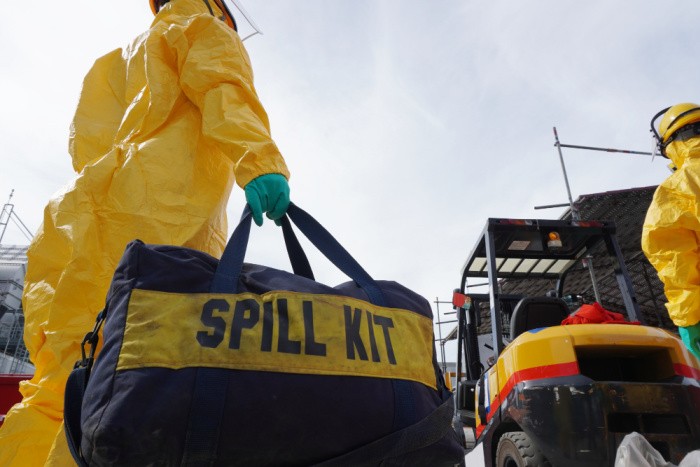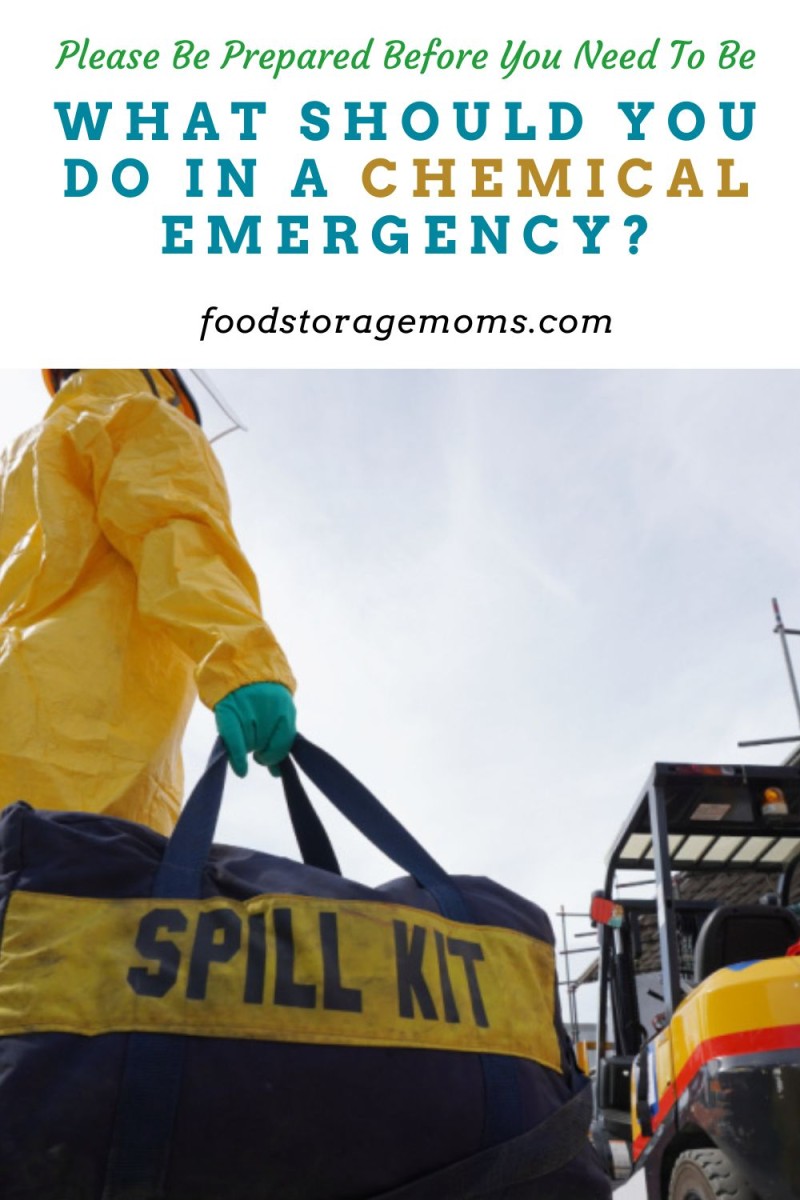
Did you know chemical emergencies happen often in the United States? Chemical emergencies can happen in several different ways, whether it’s done by accident or intentionally released in such a way as to harm others. Examples of this include a chemical spill or explosion in a warehouse, a train derailment, and even the case of a terrorist attack.
Although these types of disastrous scenarios are more unlikely to happen than other emergencies, there’s always that slim possibility. In the last month, there have been two attacks on power substations in the U.S. Although not chemical in nature, who would have thought we’d be dealing with things like that so close to home?
Do you happen to know what the proper steps are to take care of yourself and your loved ones following a chemical emergency?

Understanding a Chemical Emergency
A chemical emergency is not something that anyone should take lightly because it can be extremely dangerous and cause serious health issues very quickly. Some may even be life-threatening. If your answer was no to the question I asked earlier, I’d encourage you to stick around.
Keep reading to find out what the proper steps are that you should take if you’re ever faced with a chemical emergency. Remember that prevention is always the best route to take if you have any control over the situation at all!
Get Away
Did you know that emergency preparedness also includes chemical emergencies? Instead of worrying about what type of chemical you’ve come in contact with and determining how dangerous that it might be, the most essential thing that you can do at the moment of contact is to get far away from the area where the contamination has taken place and find a safe place as a first step.
You certainly don’t want to continue breathing in the chemical if it has a chance to be airborne. If the incident took place in the case of an industrial accident inside the building that you’re currently in, get out quickly and try to get where there’s fresh air.
If possible, move to an uphill location if you’re able to because a lot of chemicals are heavier than the air and are known to stay closer to the ground. As you get away, try not to touch anything that may have chemicals on it.
Get the Chemical Off of Skin and Clothes
If your body has been exposed to any type of dangerous chemical, even in small amounts, whether it’s been splashed on your skin or in your eyes, you need to get it cleaned off as quickly as possible. Ideally, that would be within a few minutes of when the incident occurred. Strip off all of your clothes and if available, take a shower and scrub well with soap and hot water. It may not seem like much, but this can help prevent long-term negative health effects or disabilities.
Can’t Get Undressed?
Sometimes a chemical emergency can happen while you’re at work or in public and taking your clothes off isn’t an immediate solution. If you’re unable to get undressed, the very least you should do until you’re able to take a shower is use a moist wipe or cloth and blot your skin, face, and hands with it.
Notice how I said blot and not rub your skin while removing the chemical. Always seek immediate medical attention!
I will say, if there is a chance for severe burns or other effects from contact with the chemical, it could be you strongly consider taking those close off anyway. Being temporarily embarrassed is better than suffering the physical and mental consequences of chemical contact and related effects.
Chemical(s) in Your Eyes?
Should a chemical come into contact with your eyes or you’re experiencing a burning sensation in them, you need to flush your eyes out with a clean solution immediately. Spend about 10 to 15 minutes rinsing them out with bottled water, a hose, or running water from a sink.
Don’t use eyedrops as a remedy initially since they don’t provide enough quantity of liquid and you do need larger quantities! Seek medical help ASAP!
It is always a prudent idea to use some type of eye protection when working around machinery and sources of chemicals. It’s even a good idea to wear eye protection when spraying or using a spreader to apply fertilizer in your yard. Don’t take shortcuts when working around chemicals, and don’t allow delays if you need medical attention.
Accidentally Swallowed a Chemical?
If you’ve accidentally swallowed a chemical, whether it was done by eating or drinking something, don’t make these common mistakes. While you may think that drinking plenty of fluid or trying to make yourself throw up is the best thing that you could do, you’d be wrong! There could be more risks involved in doing so.
For one, the poison might go down the wrong way and end up in your lungs. The chemical could also damage body tissue as it passes that tissue a second time on its way out. When you throw up there are times that the debris ends up in your nose and sinuses, making other treatments more difficult and dangerous. Instead of doing this, get help fast, which brings me to my next point.
Get Help in a Chemical Emergency
After you’ve gotten away from the situation and safely decontaminated, now it’s time to get help. You can do so by calling 911 or the Poison Control Center at 800-222-1222. If you’ve been directly affected by a chemical emergency, don’t waste any time and head to the nearest hospital in your area to seek medical attention without the remedial steps.
How to Properly Dispose of Items that Have Been Contaminated
When clothing or other belongings in your home or work have come into contact with a dangerous chemical substance, you’ll need to follow the disposal steps needed so that they no longer are a potential threat to anyone. Make sure that you use gloves and place those items in a plastic bag or container that can be sealed completely.
Also, make sure that you don’t put anything that’s contaminated in with your regular trash unless allowed to do so by your municipality. That way there’s no chance that someone else might accidentally touch what you’ve thrown out. If you don’t have any gloves for the job, you can use plastic bags to cover your hands.
If you work around chemicals as part of your work, hobbies, or in the course of daily activities like yardwork, you should do some research and see what’s allowed in your area regarding the disposal of hazardous waste items.
You should also have a disaster supplies kit available so you can take action quickly. A key item for the kit when considering bare essentials is a saline solution to flush your eye(s). You should also have items to treat minor burns.
I’d also suggest you have some plastic sheeting available to cover any area that’s been contaminated until it can be properly treated by professionals. If it’s a large-scale contamination like significant oil spills, try to safely contain the spill if possible by building a barrier using soil. That may not be feasible, so use your own good judgment.
Small spills could be initially cleaned up using rags that can be properly disposed of.
If you have any questions, the CDC (an official government organization) can help you with any questions you may have!
Have You Not Been Exposed?
Should the chemical emergency happen outdoors or in a building nearby and you haven’t been exposed to anything, it’s best for you to stay indoors. Close and seal off all of your windows and doors and make sure that your family and pets stay inside until the local authorities have given the all-clear that it’s safe for you to leave your home again.
Get to your safe room and turn off any fans, heaters, or air conditioner units so you don’t draw any airborne contaminants and pass them throughout your home. You should also consider closing any air vents and possibly covering them with duct tape.
It’s better to be safe than sorry, so choosing to shelter in place might be your best decision. Life-threatening emergencies happen every day from chemical emergencies, make sure you have the right first aid on hand! Uncommon First Aid Items We Should All Have
If you’re in your vehicle at the time, and the chemicals are outdoors, make sure you roll up your car windows. Chemical exposure is a real thing and you have to be quick in responding, no matter where you are located!
Last-Minute Tips for Chemical Emergencies
While there are many steps you can take to ensure your safety following a chemical emergency, there are some things you should keep in mind. For example, if you’re feeling any symptoms that might be a warning signal that you’ve been affected by a dangerous chemical, such as blurry vision or vomiting and dizziness, make sure that you seek medical attention right away.
Meanwhile, if you know anyone who may have been exposed to the chemical, make sure to stay with them until help arrives. And finally, make sure that your home is equipped with proper equipment in case of an emergency like this. Things like fire extinguishers and carbon monoxide detectors could potentially save lives during a situation like this one.
You should always keep household chemicals under lock and key so young children can’t gain access to them. Also, make sure you have updated evacuation plans in place! People’s health is important and a major chemical emergency can happen at any time, these last-minute tips can help in case of an emergency.
Final Word
These are many of the proper steps that you need to take for yourself and your family if you’re ever faced with a chemical emergency. There may be others that are appropriate, depending on the location, severity, and type of chemical(s) involved. By following them, you’ll greatly reduce your chances of having long-term health issues.
They may even help save your life! Can you think of any other tips that would be helpful following a chemical emergency that you’d be willing to mention? I’d love to hear from you! May God Bless this world, Linda
Copyright Images: Chemical Spill AdobeStock_435735967 By Tanakorn
The post What Should You Do in a Chemical Emergency? appeared first on Food Storage Moms.
